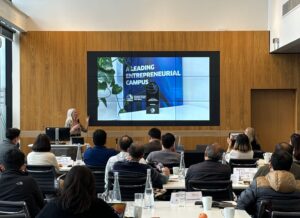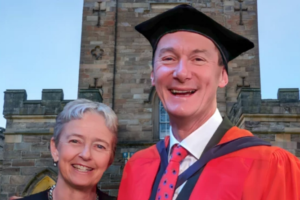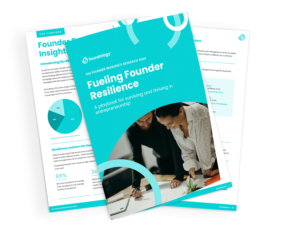Edinburgh Napier: Bright Red Triangle (BRT)
Bright Red Triangle (BRT), the enterprise hub at Edinburgh Napier University (ENU), has launched an impactful new partnership with Queen Margaret University (QMU) and Edinburgh College (EC) to extend entrepreneurial support to students, graduates, and staff across all three institutions. This collaboration will give budding entrepreneurs access to services such as expert advice, training, workshops, and pathways to turn innovative ideas into thriving ventures. Aligned with the Scottish Government’s National Innovation Strategy 2023-2033 and its Entrepreneurial Campus blueprint, the agreement seeks to build a robust entrepreneurial network across the three institutions. Read the full article for more details on this initiative.
***
Leeds Beckett: PGMOL builds on positive strides in diversity with Leeds Beckett collaboration
Experts at Leeds Beckett University – led by Dr Daniel Kilvington, have teamed up with Professional Game Match Officials Limited (PGMOL) to develop world-leading diversity programmes.Leeds Beckett’s Equality, Diversity and Inclusion (EDI) in Sport expertise has developed a pioneering Knowledge Transfer Partnership (KTP), part-funded by the Government through Innovate UK, with PGMOL. The initiative will build on the positive progress already made by PGMOL and aims to create impactful programmes that will promote diversity and inclusivity from grassroots level to the Premier League and beyond. Read more here.
***
Nottingham: New Neurodiversity & Entrepreneurship Education Toolkit launched – seeking feedback & resource recommendations
A new toolkit of best practice resources for enterprise instructors, practitioners and academics who are looking to be more inclusive of neurodivergent students and external stakeholders was launched at the annual ISBE conference on September the 6th. Compiled by ISBE President Dr Lorna Treanor of EEUK member University of Nottingham & Founder of the Charter for Inclusive Entrepreneurship, and Rob Edwards, CEO of the Neurodiversity & Entrepreneurship Association, the toolkit is now available to download for free here. Feedback and recommendations for other resources to be included can be made through the link in the toolkit, or can be emailed to info@nea.global.
***
ARU: Enterprise Visiting Scholar Programme launches at ARU
Anglia Ruskin’s Enterprise Academy (AREA) will soon be welcoming visiting scholars from China to share and develop good practice in the delivery of student enterprise and entrepreneurship support programmes. The programme will involve visiting scholars from a range of Chinese universities coming to the United Kingdom (UK) for periods of between six and twelve months and working with the AREA team on various aspects of our entrepreneurship and innovation provision. Visiting scholars will also be tasked with developing new complementary provision, which will be piloted both in the UK and China, and then disseminated across the wider academic community through a number of seminars, conferences and academic research outputs.
***
Cardiff Met: Entrepreneurship Champions
Hannah Willis and Isabelle Ford are Entrepreneurship Champions at the THE Award 2024-nominated Cardiff Metropolitan University. In an article written for Times Higher Education Campus this month, they share their top tips for cultivating an entrepreneurial mindset in students. If you’d like to see more about the impact the Cardiff Met Centre for Entrepreneurship make throughout the year, check out their 23/24 impact report. “
***
Strathclyde hosts visitors from 12 Thai universities for innovation discussion
 In October, the University of Strathclyde welcomed representatives from 12 of Thailand’s leading Universities, together with delegates from Program Management Unit for Competitiveness (PMUC), for a week-long visit focused on building innovation ecosystems. The discussions focused on the role of universities in promoting innovation, alongside public, private and community partners. The participants saw examples of collaborations between Strathclyde and Glasgow City Council, Scottish Enterprise and the Glasgow Chamber of Commerce.Associate Professor Chaleeda Borompichaichartkul said: “We looked across the world to identify new collaboration partners for innovation. What we have seen at Strathclyde shows strong leadership and culture of building entrepreneurship that is special.” Read more.
In October, the University of Strathclyde welcomed representatives from 12 of Thailand’s leading Universities, together with delegates from Program Management Unit for Competitiveness (PMUC), for a week-long visit focused on building innovation ecosystems. The discussions focused on the role of universities in promoting innovation, alongside public, private and community partners. The participants saw examples of collaborations between Strathclyde and Glasgow City Council, Scottish Enterprise and the Glasgow Chamber of Commerce.Associate Professor Chaleeda Borompichaichartkul said: “We looked across the world to identify new collaboration partners for innovation. What we have seen at Strathclyde shows strong leadership and culture of building entrepreneurship that is special.” Read more.
***
Portsmouth: TWIL interventions
“The University of Portsmouth (with Edith Cowan University, Australia) is exploring the role of transdisciplinary work-integrated learning (TWIL) in the development of graduate enterprise capabilities. Literature has focused on work placements/internships. Addressing the gap in literature we will examine in-curriculum arrangements spanning client projects, simulations and consultancy as examples of TWIL. The aim is to develop principles, guidelines and practical strategies (in the form of a toolkit) that can be implemented to benefit students and HE providers in delivering innovative forms of TWIL. Are you running any TWIL interventions? If so, we welcome a conversation. Please email Lynda.povey@port.ac.uk“
***
Durham’s Venture Lab Receives £1 million Donation for Student Innovation
 Durham University Venture Lab has received a £1 million donation from Dr. Neil Hunt, former Netflix executive and Durham alumnus, and his partner, Julie Raymond, to launch the Hunt-Raymond Innovation Programme. This initiative will offer students a range of opportunities to develop innovation skills, including an 8-week innovation summer school, innovation competitions, workshops, and scholarships. Building on the success of Durham Venture Lab programmes, such as Game Changer, EDAPT, and Enactus Durham, the Hunt-Raymond Programme aims to foster creative thinking and entrepreneurial skills among students. You can read more about the donation via the Durham University website.
Durham University Venture Lab has received a £1 million donation from Dr. Neil Hunt, former Netflix executive and Durham alumnus, and his partner, Julie Raymond, to launch the Hunt-Raymond Innovation Programme. This initiative will offer students a range of opportunities to develop innovation skills, including an 8-week innovation summer school, innovation competitions, workshops, and scholarships. Building on the success of Durham Venture Lab programmes, such as Game Changer, EDAPT, and Enactus Durham, the Hunt-Raymond Programme aims to foster creative thinking and entrepreneurial skills among students. You can read more about the donation via the Durham University website.
***
UCL: Founder Resilience Research Report
 The 2024 Founder Resilience Research Report has been launched by Christina Richardson, founder at Foundology and Associate Professor at UCL. With views and insights from nearly 400 founders, the report gives the latest snapshot on founder health and leadership, and uncovers the vital importance of founder resilience to startup success. It is filled with evidence-backed tangible strategies for how we can help build founder resilience for both entrepreneurs themselves and as those supporting them in entrepreneurship centres. Download your copy of the report here.
The 2024 Founder Resilience Research Report has been launched by Christina Richardson, founder at Foundology and Associate Professor at UCL. With views and insights from nearly 400 founders, the report gives the latest snapshot on founder health and leadership, and uncovers the vital importance of founder resilience to startup success. It is filled with evidence-backed tangible strategies for how we can help build founder resilience for both entrepreneurs themselves and as those supporting them in entrepreneurship centres. Download your copy of the report here.
